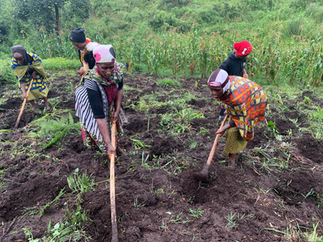Indigenous Peoples are the Guardians of the Natural World
- TreeSisters

- Jul 27, 2023
- 4 min read
Updated: Aug 2, 2023
“Climate change is caused by humans on this planet. The jungle does not expect us to save it, it just expects us to respect it. We, the indigenous peoples, expect the same thing.”
- Nemonte Nenquimo, first female president of the
Waorani organisation of Pastaza province
Indigenous Peoples occupy 20% of the Earth's land yet protect 80% of its remaining biodiversity. This staggering fact makes Indigenous Peoples the world’s most effective stewards of the natural environment. By combining centuries-old knowledge and practices prioritising nature-led conservation and deep respect for the natural world, they have achieved more than any world government and highlight how to live harmoniously alongside our natural world.

Guardians of the Natural World
Indigenous communities' profound respect for nature is well documented and starkly contrasts our tech-filled modern lives. Nature is seen not as something to be conquered or exploited but rather as a sacred source of life that must be protected and nurtured.
This protection often puts Indigenous Peoples on the frontline of the effects of climate change. Their ecosystem-based livelihoods are significantly impacted by pollution, deforestation, biodiversity loss, and land grabs - only exacerbating the human rights violations, poor socio-economic conditions, and discrimination they already face. It is common for individual groups to have to battle against loggers, land grabbers, governments, and multi-billion dollar corporations for recognition as the rightful owners and caretakers of their lands. Tragically, this fight can sometimes cost them their lives.
FACT: 70 million Indigenous Peoples
depend on forests to meet their livelihood needs
Even measures to curb climate change can often use the same colonialist and capitalist methods that caused the destruction and commodification of the earth. Initiatives like biofuel plantations, limited land access, hydroelectric dams, and monocultures are just some examples of climate "solutions" that threaten Indigenous groups.
Yet, Indigenous Peoples are not just victims of environmental destruction but key players in preserving our incredible natural world.

“Indigenous women carry the knowledge of their ancestors while also leading their communities into a resilient future.
When indigenous women engage, climate policies and actions at every level benefit from their holistic, nature-focused knowledge and leadership,”
- Patricia Espinosa, previous UN Climate Change Executive Secretary.
The Importance of Indigenous Knowledge in Ecosystem Restoration

Communities' traditional knowledge, practices, and beliefs are deeply rooted in the land. This knowledge is acquired over centuries of living successfully with their surroundings. It provides a unique understanding of the delicate balance between humans and the natural world and how to preserve it. This preservation is vital in mitigating the effects of the climate crisis. Take the Amazon rainforest, where TreeSisters Indigenous designed and led planting project with the Ashaninka people is based; this region is not only one of the most biodiverse on Earth but also plays a critical role in pulling carbon dioxide out of the atmosphere.
"The essence of life is here in the forest, in nature, in what we plant. This is the main purpose. Without nature, we don't survive. Without nature, we are nothing. Without water, without earth, without forest. We are living beings of her (nature). Otherwise, we are nothing."
- Naiana Gomez - Association of Warrior Youth within TreeSisters-supported Yorenka Tasorentsi Forest Garden project, Brazil
What is TreeSisters doing, and how can you help?

A crucial part of what makes TreeSisters unique is that we fund ethical, community-led restoration and forest protection that supports local and indigenous communities. Our planting projects in Bolivia and Brazil, as well as the Itombwe Rainforest and Kamanyola in the Democratic Republic of the Congo, identify as 90-100% Indigenous. Our approach rebalances traditional funder/funded power dynamics and values the knowledge of those working directly with the environment they inhabit.
When you support TreeSisters, not only are you taking direct climate action that plants trees, restores habitats and ecosystems and protects biodiversity, but you are saying yes to a fair and collaborative approach. One that respects and elevates local, traditional expertise putting community and nature’s needs above transactional goals. By becoming a monthly donor, you can help us continue this vital work.

TreeSisters is also proud to have worked closely with The Fountain and the Mother Earth Delegation on work such as the Ethical Tree Growing Framework. This Framework (due to launch this Autumn) emphasises the importance of bio-cultural approaches, community involvement, preserving traditional knowledge, and advocating for the rights of nature within the restoration sector.
Lastly, we adopt an ecocentric approach, extending inherent value to all life forms and ecosystems, such as trees, rivers, and mountains. Acquiring individual wealth has been valued higher than the air we breathe in our modern society. We see this current disconnect from nature as the root cause of climate change. Reconnecting and living harmoniously with our natural world is paramount to our collective efforts to protect the environment for future generations.
So, this International Day of the World's Indigenous Peoples, we stand with Indigenous Peoples everywhere to demand recognition of their rights and provision of legal and financial support for their crucial role as protectors of nature, knowledge bearers, and agents of change. The leadership of Indigenous Peoples and the integration of their traditional, nature-led wisdom is indispensable if we are to succeed in developing effective climate change solutions that benefit humanity and the planet.
Together, we can build a more just and sustainable world for all.














